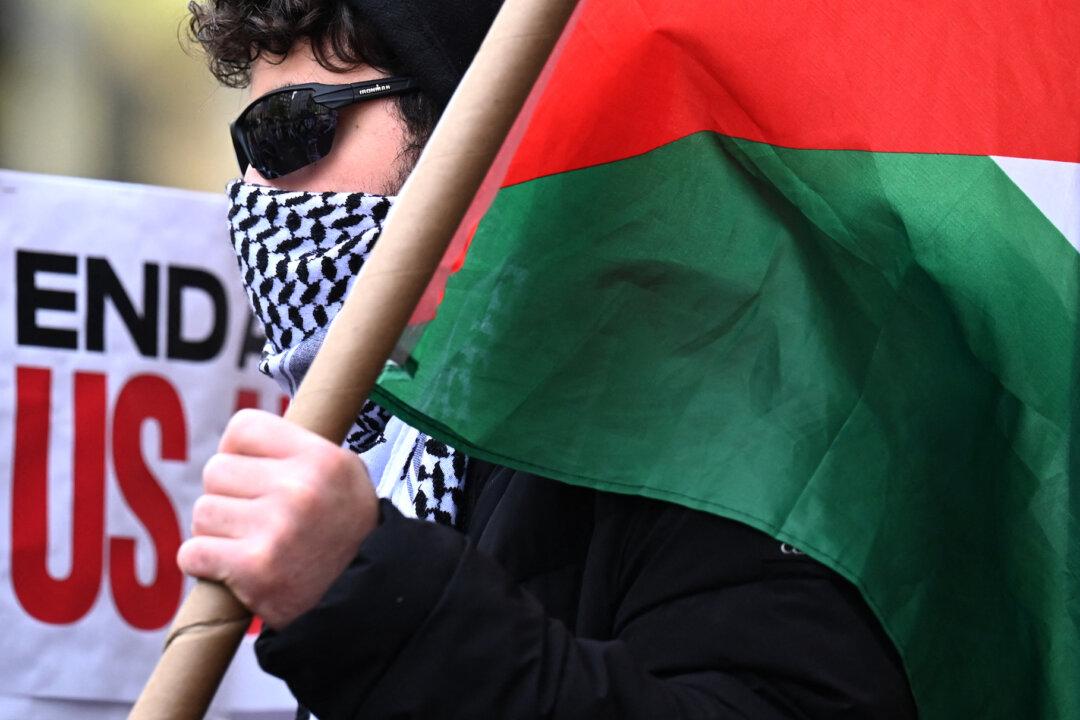A four-day encampment protest at the New Brunswick campus of Rutgers University has concluded peacefully after university administrators conceded to all but two of the pro-Palestinian protesters’ demands, while warning them that further occupation of campus grounds would be met with force.
In a university-wide email, Rutgers President Jonathan Holloway said his administration scrambled to reschedule and relocate dozens of exams following a call by the university’s chapter of Students for Justice in Palestine to stage an early-morning rally on May 2 “specifically intended to disrupt finals.”
“Students are rightly concerned about their ability to take exams in this environment,” Mr. Holloway wrote, adding that he met with the students representing the protest and gave them a deadline of 4 p.m. on May 2 to clear the encampment they set up in the heart of the campus.
Rutgers Buckles to Demands
As part of the deal, Rutgers said it will follow eight of 10 demands put forth by the protesters.For all of its official communications, Rutgers pledges to use the terms “Palestine,” “Palestinians,” and “Israeli aggressions in Palestine” instead of the more neutral-sounding “Middle East” or “Gaza region.” It also pledged to train university staff on “anti-Palestinian, anti-Arab and anti-Muslim racism” and to display flags of “Palestinian, Kurdish, Kashmiri and other disputed territories” on campus.
Most importantly, Rutgers will grant a blanket amnesty to all individuals and groups who participated in the recent pro-Palestinian protests.
“No member of the Rutgers–New Brunswick community—including faculty, staff, graduate students, undergraduate students, or alumni—found to have been involved in the encampment or related activity will face retaliation from the University, including termination of employment or reduction in compensation,” the document read.
The top two items on the list of demands were not immediately agreed upon. One of them calls for divestment from companies doing businesses with Israel. Rutgers promised to have the president and the chief investment officer meet with student representatives to discuss this matter.
In a follow up on May 2, Rutgers said it was pleased that the protest, unlike those that played out at other prestigious U.S. institutions, didn’t end with arrests. It also extended special thanks to faculty members who acted as mediators and helped deescalate the situation on campus.
Resolution Draws Bipartisan Criticism
Not everyone was pleased with the outcome. Several elected officials have criticized the school, arguing that the protesters’ disruptive behavior should not be rewarded.“Any capitulation whatsoever to antisemitic, anti-Israel, pro-Hamas protesters is absolutely disgraceful,” said Rep. Chris Smith (R-N.J.), who visited the encampment on May 2.
“Instead of rewarding unbridled hatred for Jews and the nation of Israel, Rutgers should be working to combat the violent and antisemitic threats that have been escalating against Jewish students on campus,” he said in a statement.
State Sen. Owen Henry, a Republican representing Middlesex County, where Rutgers’s flagship campus is located, denounced the school leadership for “caving to the demands of the anti-semitic demonstrators.”
“I strongly condemn Rutgers for their failure to effectively address the academic disruptions that have occurred on their campus,” he wrote in a statement. “It is imperative that Rutgers ensure the safety and well-being of all their students by holding students and staff who perpetuated messages of hatred on their campus accountable.”







